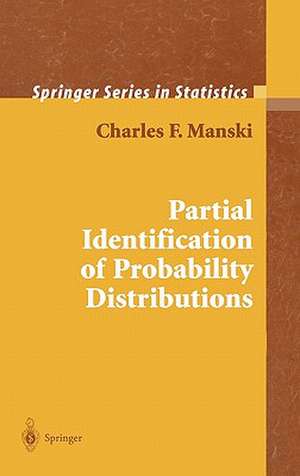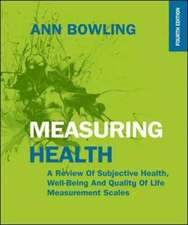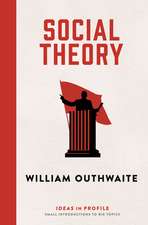Partial Identification of Probability Distributions: Springer Series in Statistics
Autor Charles F. Manskien Limba Engleză Hardback – 12 mai 2003
| Toate formatele și edițiile | Preț | Express |
|---|---|---|
| Paperback (1) | 885.33 lei 6-8 săpt. | |
| Springer – 14 dec 2011 | 885.33 lei 6-8 săpt. | |
| Hardback (1) | 890.23 lei 6-8 săpt. | |
| Springer – 12 mai 2003 | 890.23 lei 6-8 săpt. |
Din seria Springer Series in Statistics
- 14%
 Preț: 679.60 lei
Preț: 679.60 lei - 20%
 Preț: 630.98 lei
Preț: 630.98 lei - 20%
 Preț: 816.45 lei
Preț: 816.45 lei - 20%
 Preț: 1000.85 lei
Preț: 1000.85 lei -
 Preț: 390.84 lei
Preț: 390.84 lei - 20%
 Preț: 697.14 lei
Preț: 697.14 lei - 20%
 Preț: 445.20 lei
Preț: 445.20 lei - 20%
 Preț: 884.71 lei
Preț: 884.71 lei - 18%
 Preț: 1237.14 lei
Preț: 1237.14 lei - 18%
 Preț: 961.82 lei
Preț: 961.82 lei - 18%
 Preț: 956.50 lei
Preț: 956.50 lei - 18%
 Preț: 794.25 lei
Preț: 794.25 lei - 15%
 Preț: 648.05 lei
Preț: 648.05 lei - 18%
 Preț: 1217.10 lei
Preț: 1217.10 lei - 15%
 Preț: 646.11 lei
Preț: 646.11 lei - 15%
 Preț: 647.08 lei
Preț: 647.08 lei - 15%
 Preț: 646.11 lei
Preț: 646.11 lei - 18%
 Preț: 1329.76 lei
Preț: 1329.76 lei - 15%
 Preț: 652.81 lei
Preț: 652.81 lei - 18%
 Preț: 1114.52 lei
Preț: 1114.52 lei - 18%
 Preț: 952.40 lei
Preț: 952.40 lei - 18%
 Preț: 1333.42 lei
Preț: 1333.42 lei - 18%
 Preț: 1561.68 lei
Preț: 1561.68 lei - 18%
 Preț: 1231.47 lei
Preț: 1231.47 lei - 15%
 Preț: 513.64 lei
Preț: 513.64 lei - 18%
 Preț: 893.71 lei
Preț: 893.71 lei - 15%
 Preț: 649.87 lei
Preț: 649.87 lei - 18%
 Preț: 1007.65 lei
Preț: 1007.65 lei - 18%
 Preț: 1111.67 lei
Preț: 1111.67 lei - 18%
 Preț: 1223.70 lei
Preț: 1223.70 lei - 18%
 Preț: 892.74 lei
Preț: 892.74 lei - 18%
 Preț: 913.26 lei
Preț: 913.26 lei - 18%
 Preț: 943.88 lei
Preț: 943.88 lei -
 Preț: 391.61 lei
Preț: 391.61 lei -
 Preț: 391.22 lei
Preț: 391.22 lei - 18%
 Preț: 1331.18 lei
Preț: 1331.18 lei -
 Preț: 390.84 lei
Preț: 390.84 lei - 18%
 Preț: 888.45 lei
Preț: 888.45 lei - 18%
 Preț: 960.61 lei
Preț: 960.61 lei - 18%
 Preț: 1245.34 lei
Preț: 1245.34 lei - 18%
 Preț: 964.54 lei
Preț: 964.54 lei - 15%
 Preț: 643.16 lei
Preț: 643.16 lei - 18%
 Preț: 1723.76 lei
Preț: 1723.76 lei - 15%
 Preț: 643.84 lei
Preț: 643.84 lei - 15%
 Preț: 586.37 lei
Preț: 586.37 lei - 18%
 Preț: 999.59 lei
Preț: 999.59 lei - 15%
 Preț: 643.34 lei
Preț: 643.34 lei - 18%
 Preț: 806.40 lei
Preț: 806.40 lei - 18%
 Preț: 727.66 lei
Preț: 727.66 lei
Preț: 890.23 lei
Preț vechi: 1085.65 lei
-18% Nou
Puncte Express: 1335
Preț estimativ în valută:
170.37€ • 177.21$ • 140.65£
170.37€ • 177.21$ • 140.65£
Carte tipărită la comandă
Livrare economică 14-28 aprilie
Preluare comenzi: 021 569.72.76
Specificații
ISBN-13: 9780387004549
ISBN-10: 0387004548
Pagini: 179
Ilustrații: XII, 179 p. 1 illus.
Dimensiuni: 155 x 235 x 14 mm
Greutate: 0.42 kg
Ediția:2003
Editura: Springer
Colecția Springer
Seria Springer Series in Statistics
Locul publicării:New York, NY, United States
ISBN-10: 0387004548
Pagini: 179
Ilustrații: XII, 179 p. 1 illus.
Dimensiuni: 155 x 235 x 14 mm
Greutate: 0.42 kg
Ediția:2003
Editura: Springer
Colecția Springer
Seria Springer Series in Statistics
Locul publicării:New York, NY, United States
Public țintă
ResearchCuprins
Introduction: Partial Identification and Credible Inference.- Missing Outcomes.- Instrumental Variables.- Conditional Prediction with Missing Data.- Contaminated Outcomes.- Regressions, Short and Long.- Response-Based Sampling.- Analysis of Treatment Response.- Mnotone Treatment Response.- Monotone Instrumental Variables.- The Mixing Problem.
Recenzii
From the reviews:
"Charles Manski has produced a nice and compact text written with extreme care, providing technical detail, and mathematical proofs where needed." Biometrics, March 2005
"This book is an excellent and rigorous presentation of the state of research in the area of partial identification of populations and credible inference, in which the author has made many important contributions. … The overall quality of the book is very good. … The main part of each chapter is written in a textbook style. … Clearly, both methodology and the applications presented are intended to provide statisticians with a good foundation for further study in the subject … ." (Evdokia Xekalaki, Zentralblatt MATH, Vol. 1047 (22), 2004)
"I found the material very pertinent, departing, as it does, from the usual parametric approach in which the conclusions depend rather critically on the probability model adopted. Given a chance, it will make the traditionalist, like me, stop and think and perhaps, try to mend their ways a little. The main part of each chapter is written in textbook style, but fairly formally and rigorously … . At the end of each chapter appear ‘Complements’, giving examples and extensions, and ‘Endnotes’… ." (M. J. Crowder, Short Book Reviews, Vol. 23 (3), 2003)
"This book, containing ten chapters, is the first comprehensive presentation of the theory of partial identification of probability distributions. It gives an overview of the research into this topic." (M. Riedel, Mathematical Reviews, Issue 2006 g)
"The book is carefully and thoughtfully written. Some chapters start with a cogent section on the "anatomy of the problem," and all end with complements addressing specific contexts." (Alan F. Kaar, Journal of the American Statistical Association, Vol. 102, No. 477, 2007)
"Charles Manski has produced a nice and compact text written with extreme care, providing technical detail, and mathematical proofs where needed." Biometrics, March 2005
"This book is an excellent and rigorous presentation of the state of research in the area of partial identification of populations and credible inference, in which the author has made many important contributions. … The overall quality of the book is very good. … The main part of each chapter is written in a textbook style. … Clearly, both methodology and the applications presented are intended to provide statisticians with a good foundation for further study in the subject … ." (Evdokia Xekalaki, Zentralblatt MATH, Vol. 1047 (22), 2004)
"I found the material very pertinent, departing, as it does, from the usual parametric approach in which the conclusions depend rather critically on the probability model adopted. Given a chance, it will make the traditionalist, like me, stop and think and perhaps, try to mend their ways a little. The main part of each chapter is written in textbook style, but fairly formally and rigorously … . At the end of each chapter appear ‘Complements’, giving examples and extensions, and ‘Endnotes’… ." (M. J. Crowder, Short Book Reviews, Vol. 23 (3), 2003)
"This book, containing ten chapters, is the first comprehensive presentation of the theory of partial identification of probability distributions. It gives an overview of the research into this topic." (M. Riedel, Mathematical Reviews, Issue 2006 g)
"The book is carefully and thoughtfully written. Some chapters start with a cogent section on the "anatomy of the problem," and all end with complements addressing specific contexts." (Alan F. Kaar, Journal of the American Statistical Association, Vol. 102, No. 477, 2007)
Notă biografică
Charles F. Manski is Board of Trustees Professor at Northwestern University. He is author of Identification Problems in the Social Sciences and Analog Estimation Methods in Econometrics. He is a Fellow of the American Academy of Arts and Sciences, the American Association for the Advancement of Science, and the Econometric Society.
Textul de pe ultima copertă
Sample data alone never suffice to draw conclusions about populations. Inference always requires assumptions about the population and sampling process. Statistical theory has revealed much about how strength of assumptions affects the precision of point estimates, but has had much less to say about how it affects the identification of population parameters. Indeed, it has been commonplace to think of identification as a binary event – a parameter is either identified or not – and to view point identification as a pre-condition for inference. Yet there is enormous scope for fruitful inference using data and assumptions that partially identify population parameters. This book explains why and shows how.
The book presents in a rigorous and thorough manner the main elements of Charles Manski’s research on partial identification of probability distributions. One focus is prediction with missing outcome or covariate data. Another is decomposition of finite mixtures, with application to the analysis of contaminated sampling and ecological inference. A third major focus is the analysis of treatment response.
Whatever the particular subject under study, the presentation follows a common path. The author first specifies the sampling process generating the available data and asks what may be learned about population parameters using the empirical evidence alone. He then ask how the (typically) setvalued identification regions for these parameters shrink if various assumptions are imposed. The approach to inference that runs throughout the book is deliberately conservative and thoroughly nonparametric. Conservative nonparametric analysis enables researchers to learn from the available data without imposing untenable assumptions. It enables establishment of a domain of consensus among researchers who may hold disparate beliefs about what assumptions are appropriate.
Charles F. Manski is Board of Trustees Professor at Northwestern University. Heis author of Identification Problems in the Social Sciences and Analog Estimation Methods in Econometrics. He is a Fellow of the American Academy of Arts and Sciences, the American Association for the Advancement of Science, and the Econometric Society.
The book presents in a rigorous and thorough manner the main elements of Charles Manski’s research on partial identification of probability distributions. One focus is prediction with missing outcome or covariate data. Another is decomposition of finite mixtures, with application to the analysis of contaminated sampling and ecological inference. A third major focus is the analysis of treatment response.
Whatever the particular subject under study, the presentation follows a common path. The author first specifies the sampling process generating the available data and asks what may be learned about population parameters using the empirical evidence alone. He then ask how the (typically) setvalued identification regions for these parameters shrink if various assumptions are imposed. The approach to inference that runs throughout the book is deliberately conservative and thoroughly nonparametric. Conservative nonparametric analysis enables researchers to learn from the available data without imposing untenable assumptions. It enables establishment of a domain of consensus among researchers who may hold disparate beliefs about what assumptions are appropriate.
Charles F. Manski is Board of Trustees Professor at Northwestern University. Heis author of Identification Problems in the Social Sciences and Analog Estimation Methods in Econometrics. He is a Fellow of the American Academy of Arts and Sciences, the American Association for the Advancement of Science, and the Econometric Society.














